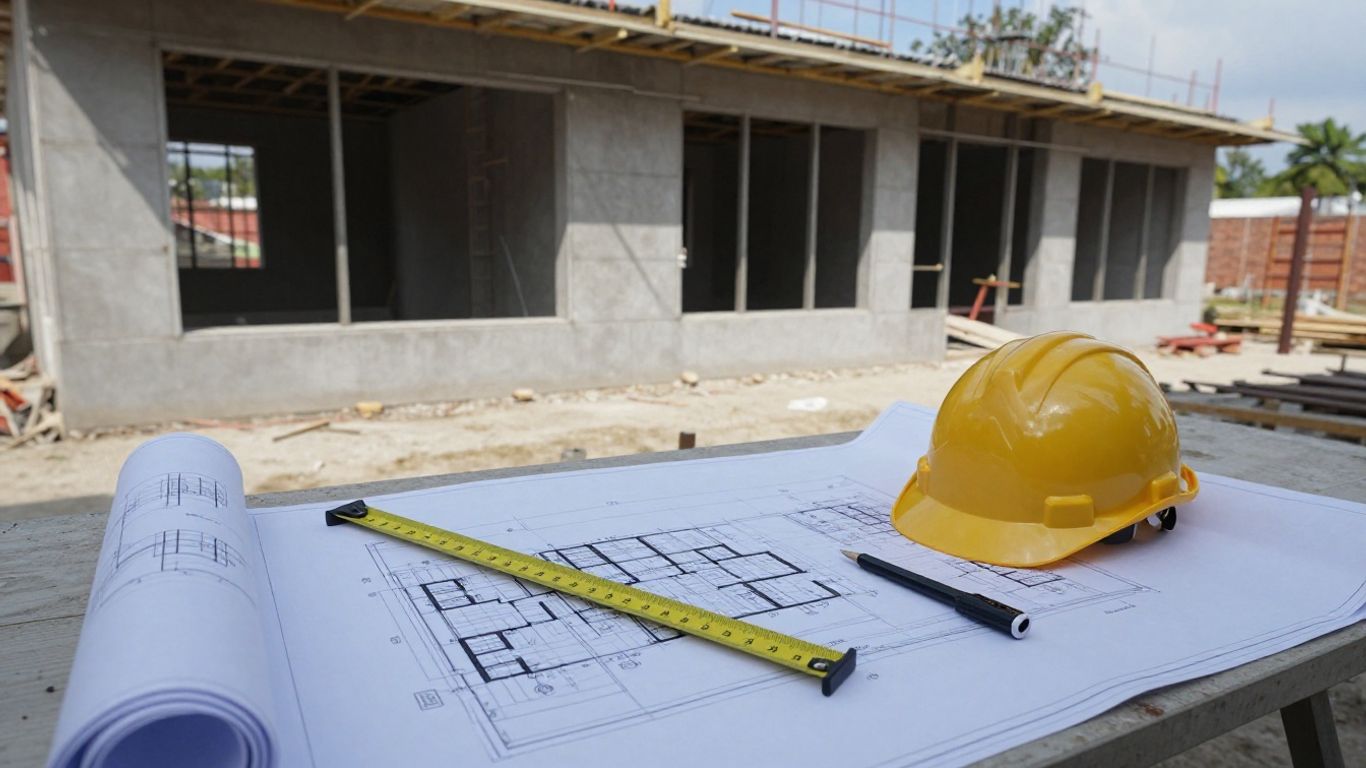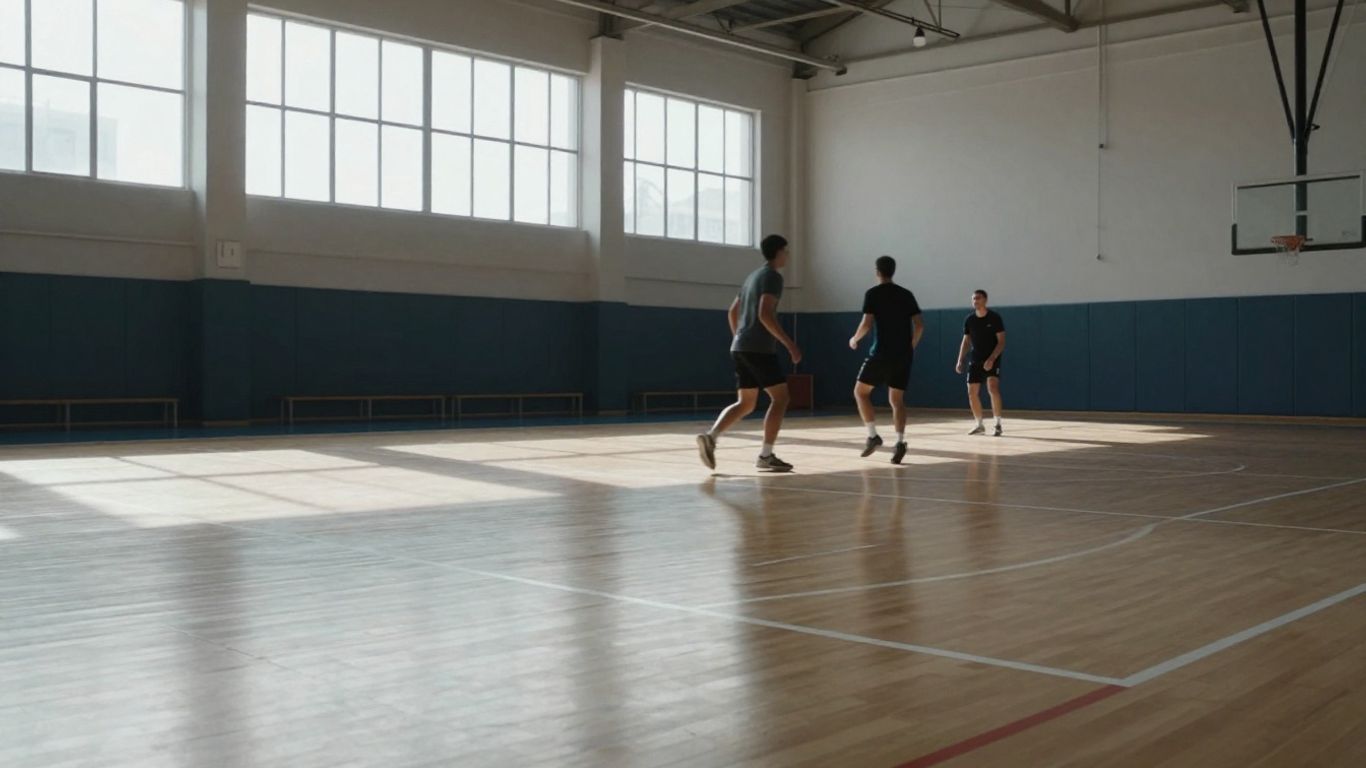If you’ve ever been to a choir rehearsal in a hall with dodgy sound, you’ll know it’s not much fun. It can make singing a real challenge, and honestly, it just doesn’t sound very good. But there’s good news! Upgrading the flooring in these spaces, especially in places like Birmingham’s community choir halls, can make a huge difference. We’re talking about better sound for everyone, from the singers to the audience. This article is all about how Acoustic Flooring Upgrades can transform these spaces for the better.
Key Takeaways
- Poor acoustics really mess with how a choir sounds and how well they can perform.
- Good acoustic flooring helps make music clearer and creates a much nicer place to rehearse.
- There are some cool new flooring materials and systems that can really sort out sound problems.
- Planning these upgrades properly, maybe with some experts, is super important for getting it right.
- Investing in better flooring helps choirs sound great, keeps members happy, and makes the hall a better place for the whole community.
.
Understanding Acoustic Challenges in Choir Halls

The Impact of Poor Acoustics on Choral Performance
Poor acoustics can really mess with a choir’s sound. It’s not just about how loud things are, but how clear and balanced the sound is. When the acoustics are bad, singers struggle to hear each other, making it hard to blend and stay in tune. This leads to frustration, fatigue, and ultimately, a less-than-stellar performance. Think of it like trying to have a conversation in a crowded pub – you have to shout to be heard, and it’s exhausting. Good acoustics, on the other hand, allow singers to hear themselves and each other clearly, leading to better intonation, balance, and overall musicality. It also helps with critical listening skills. The choice of sports flooring can also impact gym acoustics.
Identifying Common Acoustical Shortcomings
So, what are some of the usual suspects when it comes to bad acoustics in choir halls? Well, there are a few common problems:
- Excessive reverberation: This is when sound lingers for too long, creating a muddy, unclear sound. It’s like singing in a bathroom – the sound bounces around and becomes a jumbled mess.
- Echoes: Distinct reflections of sound that can be distracting and make it difficult to hear the music clearly.
- Standing waves: These are caused by sound waves bouncing between parallel surfaces, creating areas of amplified and cancelled sound. This can result in some singers being too loud and others being too quiet.
- Lack of diffusion: This is when sound is not evenly distributed throughout the room, leading to dead spots and hot spots.
.
Addressing these shortcomings is key to creating a space where a choir can truly thrive. It’s about more than just making the space sound ‘nice’; it’s about creating an environment that supports learning, collaboration, and artistic expression.
Why Dedicated Rehearsal Spaces Matter
Having a dedicated rehearsal space is a game-changer for any choir. It’s not just about having a room to practise in; it’s about having a space that’s designed specifically for choral music. A dedicated space allows for consistent practise conditions, which is vital for developing a cohesive sound. It also allows the choir to develop a sense of ownership and pride in their space. Plus, when the acoustics are right, rehearsals become more efficient and enjoyable. Think about it – no more struggling to hear each other, no more battling with echoes, just pure, unadulterated music-making. It’s an investment in the choir’s future, plain and simple. It helps students improve intonation, articulation, balance, blend, interpretation, and critical listening techniques.
The Benefits of Acoustic Flooring Upgrades
Upgrading the flooring in your community choir hall might not be the first thing that springs to mind when thinking about acoustics, but it can make a surprising difference. It’s not just about aesthetics; it’s about creating a better environment for both performers and listeners. Let’s explore some of the key advantages.
Enhancing Sound Clarity and Intonation
Acoustic flooring can significantly reduce unwanted reverberation and echoes, leading to improved sound clarity. This is especially important for choirs, where precise intonation and clear articulation are essential. When sound waves bounce around excessively, it becomes difficult for singers to hear themselves and each other accurately. This can lead to flat or sharp notes, muddy harmonies, and a general lack of cohesion. By absorbing sound, acoustic flooring helps to create a drier, more controlled acoustic environment, allowing singers to hear the true sound of their voices and make necessary adjustments. This is similar to how sports flooring impacts gym acoustics.
Creating Optimal Rehearsal Environments
Rehearsal spaces need to be conducive to focused practise and learning. Poor acoustics can be distracting and fatiguing, making it difficult for singers to concentrate and learn new pieces. Acoustic flooring can help to create a more comfortable and productive rehearsal environment by reducing noise levels and improving sound quality. This can lead to:
- Reduced vocal strain and fatigue.
- Improved concentration and focus.
- More efficient use of rehearsal time.
- A more positive and enjoyable rehearsal experience.
.
A well-designed acoustic environment can transform a choir hall from a noisy, echoey space into a haven for musical expression. It’s about creating a space where singers can feel comfortable, confident, and inspired to perform at their best.
Improving Performer and Audience Experience
The benefits of acoustic flooring extend beyond the rehearsal room and into performance. When the acoustics are good, singers can hear themselves and each other clearly, allowing them to perform with greater confidence and precision. This translates into a better experience for the audience, who can enjoy a clearer, more balanced sound. Think about it – no one wants to strain to hear the sopranos or struggle to understand the lyrics. Good acoustics ensure that every voice is heard and that the music is presented in the best possible light. This is why schools invest in premium sports options.
Innovative Acoustic Flooring Solutions
Specialised Materials for Sound Absorption
When it comes to choir halls, it’s not just about stopping sound from escaping; it’s about controlling how sound behaves inside the room. Specialised flooring materials play a big role in this. Think beyond your standard carpet. We’re talking about materials designed with specific densities and textures to soak up sound waves, reducing echoes and that muddy feeling you get when too many frequencies are bouncing around. These materials often incorporate recycled content, making them a sustainable choice too. It’s a win-win!
Integrated Systems for Reverberation Control
It’s not just about the material itself, but how it works as part of a bigger system. Integrated systems consider the whole room, not just the floor. This might involve:
- Underlayments designed to dampen vibrations.
- Acoustic panels on the walls that complement the flooring.
- Careful consideration of the room’s shape and size.
.
These systems aim to create a balanced acoustic environment, where sound is clear and natural, not overwhelming. For example, sports hall flooring services can be integrated with wall panels to maximise sound absorption.
Active Acoustic Technologies for Versatility
Now, this is where things get really interesting. Active acoustic technologies use microphones and speakers to actively control the sound in a room. Imagine a system that can adjust the room’s acoustics at the touch of a button, making it suitable for both rehearsals and performances.
These systems can be expensive, but they offer unparalleled flexibility. You can simulate different acoustic environments, allowing your choir to practise in conditions that mimic concert halls or smaller, more intimate spaces. This is a game-changer for improving performance and adaptability.
Here’s a quick look at some of the benefits:
- Adjustable reverberation time.
- Targeted sound absorption.
- Simulation of different acoustic environments.
.
Planning Your Acoustic Flooring Upgrade Project

So, you’re thinking about upgrading the flooring in your community choir hall to improve the acoustics? Great idea! But before you jump in, there are a few things to consider to make sure the project goes smoothly and you get the best possible results. It’s not just about picking a nice-looking floor; it’s about creating a space where your choir can really shine.
Assessing Current Hall Acoustics
First things first, you need to understand what you’re working with. What are the current acoustic issues in your choir hall? Is there too much echo? Is it hard to hear different sections of the choir clearly? A thorough assessment is the starting point. Walk around the hall while the choir is rehearsing and listen carefully. Note down any specific problems you notice. Consider things like:
- How sound reflects off different surfaces.
- Where sound gets absorbed (or doesn’t!).
- Areas where sound seems muffled or unclear.
.
It might be useful to record a rehearsal and listen back to it critically. This can help you identify issues you might not notice in the moment. Also, think about getting feedback from the choir members themselves – they’re the ones who use the space most often, so their opinions are important.
Collaborating with Acoustic Specialists
Unless you’re an acoustics expert yourself, it’s a really good idea to bring in some professional help. An acoustic specialist can conduct a detailed analysis of your hall and recommend the best flooring solutions for your specific needs. They’ll use fancy equipment and calculations to figure out exactly how sound is behaving in the space. Look for specialists with experience in performance venues or music spaces. They can provide acoustic design & installation advice tailored to your choir’s requirements. A good specialist will:
- Conduct acoustic measurements.
- Provide detailed reports and recommendations.
- Help you choose the right materials and installation methods.
.
Budgeting for Effective Solutions
Okay, let’s talk money. Acoustic flooring upgrades can range in price depending on the size of your hall, the materials you choose, and the complexity of the installation. It’s important to set a realistic budget from the start and stick to it as much as possible. Don’t just focus on the initial cost of the flooring itself; remember to factor in things like:
- Professional acoustic assessments.
- Subfloor preparation.
- Installation costs.
- Potential ongoing maintenance.
.
Consider getting quotes from several different suppliers and installers to compare prices. And remember, investing in quality acoustic flooring is a long-term investment in your choir’s performance and the overall experience for both performers and audience. You might even be able to find funding or grants to help cover the costs. For example, you might want to look into sports hall flooring options if your choir hall is also used for other activities.
Case Studies in Birmingham and Beyond
Successful Upgrades in Local Venues
Let’s have a look at some real-world examples of how acoustic flooring upgrades have transformed spaces, starting right here in Birmingham. It’s not just about theory; it’s about seeing the tangible difference these changes make. For example, Aston University’s sports hall floor restoration by Courtship Flooring shows how addressing structural issues and applying modern finishes can rejuvenate a space.
- The refurbishment of the Symphony Hall at the ICC Birmingham is another great example. Upgrading the Voice Alarm systems improved music routing for performance spaces and bars.
- Arena Birmingham (now Utilita Arena) also saw significant improvements with the replacement of its public address and voice alarm systems, ensuring clear communication throughout the venue.
- Even smaller community spaces, like Flitch Green Community Hall, have benefited from acoustic treatment to improve sound quality for various events.
.
These local projects demonstrate that acoustic upgrades are not just for large concert halls. They can make a real difference in any space where sound quality is important.
Lessons from International Performance Spaces
Looking beyond Birmingham, we can learn a lot from international performance spaces that have prioritised acoustics. These venues often incorporate cutting-edge technologies and design principles to achieve optimal sound quality. Here are some key takeaways:
- Material Selection: Many top venues use specialised materials like high-density rubber or composite underlays to minimise impact noise and vibration.
- Reverberation Control: Adjustable acoustic panels and diffusers are common features, allowing venues to tailor the sound to different types of performances.
- Active Acoustics: Some spaces employ active acoustic systems that use microphones and speakers to electronically adjust the room’s acoustics in real-time.
.
Transforming Community Music Facilities
Ultimately, the goal of acoustic flooring upgrades is to transform community music facilities into spaces that inspire creativity and foster a love of music. This means creating environments that are comfortable, functional, and acoustically pleasing. Here’s how these upgrades can make a difference:
- Improved Rehearsal Conditions: Reduced noise and clearer sound make rehearsals more productive and enjoyable.
- Enhanced Performance Quality: Performers can hear themselves and each other more clearly, leading to better intonation and ensemble playing.
- Increased Community Engagement: A well-designed acoustic space can attract more performers and audience members, boosting community participation.
.
Investing in acoustic flooring is an investment in the future of your choir and your community. By creating a space that sounds great, you’re creating a space where music can thrive.
Long-Term Advantages of Quality Acoustic Flooring
Attracting and Retaining Talent
Investing in acoustic flooring isn’t just about sound; it’s about creating a welcoming and professional environment. A choir hall with excellent acoustics becomes a magnet for talented singers. Think about it: musicians want to perform in spaces where they can truly hear themselves and blend effectively with others. Poor acoustics can lead to frustration, vocal strain, and ultimately, members leaving for better-sounding venues. Good acoustics, on the other hand, fosters a sense of pride and accomplishment, encouraging singers to stay and attracting new members.
Future-Proofing Your Choir Hall
Acoustic flooring isn’t a one-time fix; it’s a long-term investment. Trends in music and performance styles may change, but the need for good sound quality will always remain. By installing quality acoustic flooring, you’re ensuring that your choir hall can adapt to different musical genres and performance needs for years to come. This reduces the need for costly renovations or acoustic treatments down the line. Consider it a proactive step towards creating a versatile and enduring space for musical expression.
Boosting Community Engagement
A choir hall with great acoustics isn’t just for the choir. It can become a valuable asset for the entire community. Think about hosting concerts, workshops, or even recording sessions. Good acoustics can transform your hall into a sought-after venue, attracting audiences and generating revenue. This increased visibility can lead to greater community support and funding opportunities, ensuring the long-term sustainability of your choir and its activities.
Here’s a simple breakdown of potential benefits:
- Increased concert attendance
- Higher rental income from external events
- Improved reputation within the community
- Stronger relationships with local businesses and organisations
.
Good acoustic flooring lasts ages and makes your place much nicer. It helps keep noise down and makes rooms feel comfy. Want to know more about how we can help you? Check out our website for all the details.
Conclusion
So, there you have it. Getting the flooring right in Birmingham’s community choir halls really makes a difference. It’s not just about making things sound better, though that’s a big part of it. Good flooring helps singers hear each other, which means they can sing together more easily and sound more together. It also makes the whole place feel nicer, more professional, and just a better spot for everyone to enjoy making music. Thinking about these upgrades is a smart move for any choir hall looking to make their space work better for everyone who uses it.
Improve acoustics → Sports Hall Flooring Installations
Frequently Asked Questions
How does special flooring help choir halls?
Acoustic flooring helps choir halls by making sounds clearer and stopping echoes. This means singers can hear each other better, which helps them sing in tune and blend their voices nicely. It also makes the whole performance sound much better for anyone listening, whether they’re in the choir or the audience.
What happens if a choir hall has bad acoustics?
Poor acoustics can make it hard for choir members to hear themselves and others, leading to off-key singing and a messy sound. It can also make the room feel uncomfortable and tiring for performers and listeners alike. Good flooring fixes these problems.
Is changing the flooring worth the money?
Yes, definitely! Good acoustic flooring is a smart investment because it improves the sound quality, makes the space more comfortable, and can even help attract more people to join or attend performances. It’s a long-term benefit for the whole community.
What kind of materials are used for acoustic flooring?
We use special materials that soak up sound, stopping it from bouncing around too much. Some systems can even change how the sound behaves in the room, making it suitable for different types of music or performances. It’s all about controlling the sound waves.
How do we start a flooring upgrade project?
First, we look at how your hall sounds right now to find its weak spots. Then, we work with experts who know all about sound to pick the best flooring for your needs and budget. It’s a team effort to get the best results.
Have other places in Birmingham done this kind of upgrade?
Many places in Birmingham, like the ICC Symphony Hall, have already improved their sound with new systems. We can learn from these examples and from other great music venues around the world to make your choir hall sound amazing too.


